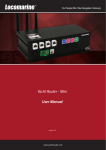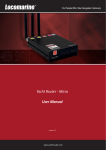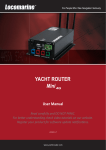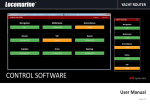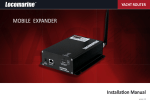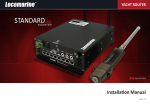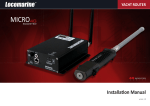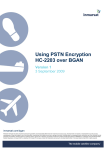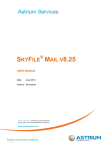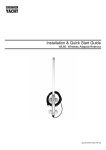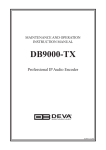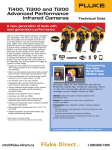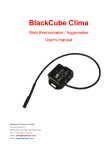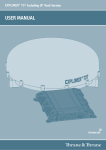Download User Manual - Yacht Router
Transcript
User Manual Read carefully and DO NOT PANIC. For better understanding check video tutorials on our website. Register your product for software update notifications. version 1.2 www.yachtrouter.com 1. 1. 2. 3. 4. 5. 6. 7. 8. 9. 10. 10.1. 10.2. 10.3. 10.4. 10.5. 10.6. 10.7. 11. 12. 12.1. 12.2. 12.3. 12.4. 13. CONTENTS COPYRIGHT NOTICE ........ 3 RoHS COMPLIANT ........ 3 INTRODUCING YACHT ROUTER SOLUTION DISCLAIMER AND WARNING ........ 3 DECLARATION OF CONFORMITY ........ 3 SAFETY AND HAZARD ........ 4 SAFETY INSTRUCTION ........ 4 ABOUT YACHT ROUTER MICRO 4G ........ 5 FEATURES ........ 6 SPECIFICATIONS ........ 6 ........ 3 WAN, LAN, Backbone networks ........ 6 Expanders and Extenders support ........ 6 Vessel-to-Shore WIFI ........ 6 Client-to-Vessel WIFI ........ 6 Mobile network ........ 7 Power, environment and dimensions ........ 7 Software features ........ 7 PACKAGING ........ 7 INSTALLATION INSTRUCTIONS ........ 8 Connecting WIFI and mobile network antennas ........ 8 Connecting power supply ........ 9 Inserting SIM card ........ 10 LED indicators and Service Port ........ 10 SETUP PROCEDURE ........ 11 13.1. 13.2. 13.3. 13.4. 13.5. Installing Yacht Router 4G Control Software on computer with Windows operating system ........ 11 Installing Yacht Router 4G Control Software on your iPhone or iPad ........ 11 Installing Yacht Router 4G Control Software on your Android smart phone or tablet ........ 11 Connecting Touch Screen Controller 4G ........ 11 Power on Yacht Router ........ 12 14.1. 14.2. 14.3. 14.4. 14.5. 14.6. 14.7. Initial screen ........ 13 Main screen ........ 13 SETUP screen ........ 15 Configuration screen ........ 16 Mobile WAN Networks setup ........ 17 Shore WIFI WAN Networks setup ........ 20 Vessel Network setup ........ 23 14. 15. 16. 17. 18. 19. 20. Yacht Router 4G Control Software ........ 13 ONLINE REMOTE SUPPORT ........ 24 NETWORK DETAILS ........ 25 YACHT ROUTER CONFIGURATION TOOL ........ 26 LOCOMARINE LIMITED FACTORY WARRANTY ........ FCC INTERFERENCE STATEMENT ........ 26 INDUSTRY CANADA NOTICE TO USERS ........ 26 26 www.yachtrouter.com 2 1.COPYRIGHT NOTICE Locomarine d.o.o. reserves the rights to alter the products described in this manual at any time without prior notice. This document contains proprietary information protected by copyright. All rights are reserved. No part of this manual may be reproduced by any mechanical, electronic, or other means in any form without prior written permission of the manufacturer. Information provided in this manual is intended to be accurate and reliable. However, Locomarine d.o.o. assumes no responsibility for use of this manual, nor for any infringements upon the rights of third parties, which may result from such use. 2.RoHS COMPLIANT All models in the Yacht Router series comply with the Restriction of Hazardous Materials (RoHS) Directive. This means that all components used to build Yacht Router are RoHS compliant. The RoHS Directive bans the placing on the EU market of new electrical and electronic equipment containing more than agreed levels of lead, cadmium, mercury, hexavalent chromium, polybrominated biphenyl (PBB) and polybrominated diphenyl ether (PBDE) flame retardants. 3.INTRODUCING YACHT ROUTER SOLUTION Yacht Router is a complete network infrastructure solution for yacht or boat of any size. Yacht Router devices will help you to easily install, setup and control Internet connection on your yacht. The most important part of Yacht Router solution is software that control complete system. It is designed by professionals specialized in yacht communication systems in collaborations with experienced yacht captains. The result is a system that is simple to operate, maintain and control. Underneath simple touch user interface, Yacht Router is a solution with industry level of reliability, performance and unprecedented level of security. 4.DISCLAIMER AND WARNING The contest of this manual are well prepared by Locomarine d.o.o. While we try to improve our equipment at all time, Locomarine d.o.o. shall incur no liability based on contest, updates or modification of the contest, or the lack of contents in this manual. Because of the nature of wireless communications, transmission and reception of data can never be guaranteed. Data may be delayed, corrupted (i.e., have errors) or be totally lost. Although significant delays or losses of data are rare when wireless devices such as the Yacht Router are used in a normal manner with a well-constructed network, the Yacht Router device should not be used in situations where failure to transmit or receive data could result in damage of any kind to the user or any other party, including but not limited to personal injury, death, or loss of property. Locomarine d.o.o. and its affiliates accept no responsibility for damages of any kind resulting from delays or errors in data transmitted or received using the Yacht Router device, or for failure of the Yacht Router device to transmit or receive such data. The equipment said in this manual must only be used to which it was designed. Improper operation or installation may cause damages to the equipment or personal injury. Locomarine d.o.o. will not incur any liability of equipment damage or personal injury due to improper use or installation of the equipment. It is strongly recommended to read this manual and the following safety instructions before proceeding to installation or operation. 5.DECLARATION OF CONFORMITY Hereby, Locomarine d.o.o. declares that this Yacht Router device is in compliance with the essential requirements and other relevant provisions of Directive 1999/5/EC on R&TTE: Article 3.2 (radio): ETSI EN 300 328 V1.7.1:2007 Article 3.1.b (EMC): ETSI EN 301 489-1 V1.9.2 (2011-09) ETSI EN 301 489-17 V2.1.1 (2009-05) Article 3.1.a (Safety): ETSI EN 60950-1:2006+A1:2010; EN 60950-22:2006 www.yachtrouter.com 3 6.SAFETY AND HAZARD Do not operate your Yacht Router: • • In areas where blasting is in progress. Where explosive atmospheres may be present including refuelling points, fuel depots, and chemical plants, near medical equipment, life support equipment, or any equipment which may be susceptible to any form of radio interference. In such areas, the Yacht Router MUST BE POWERED OFF. Otherwise, the Yacht Router can transmit signals that could interfere with this equipment. In an aircraft, the Yacht Router MUST BE POWERED OFF. Otherwise, the Yacht Router can transmit signals that could interfere with various onboard systems and may be dangerous to the operation of the aircraft or disrupt the cellular network. Use of a cellular and WIFI equipment in an aircraft is illegal in some jurisdictions. Failure to observe this instruction may lead to suspension or denial of cellular services to the offender, or legal action or both. IMPORTANT: Exposure to Radio Frequency Radiation. 20 cm minimum distance has to be maintained between the antenna (any) and the occupational user and 75 cm to general public. 7.SAFETY INSTRUCTION ELECTRICAL SHOCK HAZARD: Do not open enclosure of the equipment if you are not qualified to do it. TURN OFF THE POWER IMMEDIATELY IF WATER LEAKS INTO THE EQUIPMENT OR OBJECT DROPS INTO THE EQUIPMENT: Continue operating the equipment could cause electrical shock or fire. Contact your nearest distributor or dealer for service. DO NOT DISASSEMBLE THE EQUIPMENT OR MODIFY THE EQUIPMENT: Improper disassemble or modification could cause electrical shock, fire, or personal injury. AVOID OPERATING THE EQUIPMENT WITH WET HANDS: Electrical shocks could be resulted if operating with wet hands. USE PROPER FUSE: Damage to the equipment or fire could be resulted if using improper fuse. TURN OFF THE POWER IMMEDIATELY IF THE EQUIPMENT IS EMITTING SMOKE OR FIRE: Continue operating the equipment could cause electrical shock or fire. Contact your nearest distributor or dealer for service. DO NOT PLACE ANY LIQUID-FILLED CONTAINER ON TOP OF THE EQUIPMENT. www.yachtrouter.com 4 8.ABOUT YACHT ROUTER MICRO 4G Yacht Router Micro 4G is intended for installation on smaller boats and yachts without satellite Internet source (VSAT, Inmarsat, Iridium etc). It will give you ability to establish single vessel WIFI network (Client-to-Vessel) that you will be able to connect to other WIFI networks (e.g. marina WIFI Hotspots) or mobile networks (4G/3G/EDGE/GSM). Schematic drawing of Yacht Router Micro 4G capability and connectivity. www.yachtrouter.com 5 9.FEATURES - ultra high power Vessel-to-Shore network (1600mW, b/g/n) - high power 4G/3G/2G module (250-2000mW) - 1x Client-to-Vessel WIFI network (b/g) - 1x LAN port (100 Mbps) - Online Remote Support - wide range DC power input (9-18 V) - wall mount aluminum enclosure 10. SPECIFICATIONS 10.1. WAN, LAN, Backbone networks Ethernet WAN ports: not available Ethernet LAN ports: 1 Backbone LAN ports: not available Mobile Expander ports: not available Max. data rate on WAN/LAN/Backbone (per port): 100 Mbps 10.2. Expanders and Extenders support WIFI Extender support: no PoE injector power outputs: not available Mobile Expander support: no LAN Expander support: no Max. number of supported Mobile Expanders: not available Max. number of supported LAN Expanders: not available WIFI/LAN Expander DC power outputs: not available 10.3. Vessel-to-Shore WIFI Internal WIFI module: yes Remote WIFI module (PoE, outdoor): no Supported standards: b/g/n Max. data rates (Mbps): 100 Max. transmit power (dBm): 32 Max. transmit power (mW): 1600 Sensitivity of included antenna (dB): 5 Antenna connector type (on device): N-type female 10.4. Client-to-Vessel WIFI Max. number of networks: 1 Supported standards: b/g Max. data rates (Mbps): 54 Max. transmit power (dBm): 20 Max. transmit power (mW): 100 Sensitivity of included antenna (dB): 5 Antenna connector type (on device): N-type female www.yachtrouter.com 6 10.5. Mobile network Integrated modems: 1 Europe/Africa/Asia/Oceania modem: LTE freq. (MHz): 800 (B20), 900 (B8), 1800 (B3), 2100 (B1), 2600 (B7) WCDMA freq. (MHz): 900 (B8), 2100 (B1) GSM/GPRS/EDGE freq. (MHz): 900, 1800, 1900 Americas modem: LTE freq. (MHz): 700 (B17), AWS (B4), 2100 (B1) WCDMA freq. (MHz): 800 (B6), 850 (B5), 1900 (B2), 2100 (B1) GSM/GPRS/EDGE freq. (MHz): 850, 900, 1800, 1900 Max. download rates (Mbps): 100 Max. upload rates (Mbps): 50 Max. transmit power in LTE/4G (dBm): 24 Max. transmit power LTE/4G (mW): 250 Max. transmit power in WCDMA (dBm): 24 Max. transmit power WCDMA (mW): 250 Max. transmit power in GSM/GPRS/EDGE (dBm): 33 Max. transmit power GSM/GPRS/EDGE (mW): 2000 SIM card slots: 1 SIM card size: standard GSM (ID-000) Sensitivity of included antenna (dB): 2 Antenna connector type (on device): RP-SMA female 10.6. Power, environment and dimensions 10.7. Software features 11. PACKAGING DC power supply input range (V): 9-18 AC power supply input range (V): not available Automatic switching AC-DC power controller: no Max. power consumption (W, without WIFI Extenders): 17 Operating temperature range (°C): -10 to +60 Operating humidity range (%, non-condensing): 5-95 Enclosure material: aluminium Enclosure mount type: wall IP Protection: IP50 Dimension (mm, WxDxH, without antennas): 150 x 199 x 52 Hotspot: no Hotspot supported on Client-to-Vessel WIFI networks: not available WAN Auto-switching: no Online Remote Support: yes Selectable WAN source for each vessel network: yes Detailed usage statistics: yes Flexible assigning of LAN ports to vessel WIFI networks: no Customizable WIFI power output: yes Mobile Network Bonding: not available Cloud Service: yes Available remote user accounts for private access: 1 Number of on-board devices reachable through public access: 1 Number of on-board devices reachable through private access: unlimited When shipped, all devices are wrapped in a plastic bags that protects it from humidity. Device is then placed into a cardboard box. A bag containing accessory items is placed inside the box too. List of included accessories is included in the package. www.yachtrouter.com 7 12. INSTALLATION INSTRUCTIONS Install Yacht Router Micro 4G in a dry indoor space that will meet Operating environment range specifications (chapter 9.6). Follow the installation procedure as specified in this chapter. WARNING: Exposure to Radio Frequency Radiation! 20 cm minimum distance has to be maintained between the antenna (any) and the occupational user and 75 cm to general public. 12.1. Connecting WIFI and mobile network antennas WARNING: NEVER POWER ON YACHT ROUTER IF MOBILE NETWORK ANTENNA IS NOT CONNECTED TO YACHT ROUTER TO AVOID SEVERE DAMAGES ON MOBILE NETWORK MODULE THAT CAN VOID THE WARRANTY. Connect WIFI and mobile antennas as showed on the following photo: Locomarine WIFI 5 antenna (swivel, indoor) - WLAN-A-05 Locomarine MOB 5 antenna (swivel, indoor) - 3G-A-01 WIFI antenna extension cable 1m - WLEC-01 IMPORTANT: Never place antennas in the same horizontal level. If you cannot avoid that position, minimum horizontal distance between antennas should be 1 meter. If you do not follow that rule, strong interference on both antennas could occur that could significantly degrade data traffic, transmitting and receiving performance. NEVER CONNECT BOTH WIFI ANTENNAS DIRECTLY TO YACHT ROUTER. Use WIFI antenna extension cables supplied with your system. www.yachtrouter.com 8 When internal antennas does not give satisfied connectivity we suggest installation of external WIFI antenna that will increase range and performance in vessel-to-shore connectivity (e.g. Hotspot in marina). We suggest the same for mobile network antenna too. If you plan to install external antennas use only high-quality antennas and low-less coax cables to avoid signal degradation (check our website www.yachtrouter.com). Example of External WIFI and Mobile antennas with various mounts connected via coax cables to Yacht Router. SCAN UHF3G3B3 mobile network antenna Deck mount Adaptor tube RP-SMA male to N-type female adaptor - RTN-01 12.2. Connecting power supply Yacht Router Micro 4G has wide range DC power supply (9-18 VDC). We strongly suggest you to install proper fuses (2.5A) on power supply sources cable (positive - red cable). Connect power cable that is supplied with Yacht Router where RED is positive and BLACK cable is negative (ground). WARNING: WRONGLY CONNECTED DC POWER CABLE CAN DESTROY YACHT ROUTER THAT CAN VOID THE WARRANTY. PROVIDE SUFFICIENT POWER SUPPLY. INSUFFICIENT POWER SUPPLY WILL REPEATEDLY RESET AND DAMAGE YACHT ROUTER THAT CAN VOID THE WARRANTY. www.yachtrouter.com 9 12.3. Inserting SIM card Yacht Router Micro 4G will work with any Standard GSM (ID-000) SIM card. If you have micro or nano SIM card you will have to obtain proper adaptor. Insert SIM card as it is showed on the following photo: 12.4. LED indicators and Service Port Yacht Router Micro 4G has two LED indicators. Blue LED indicate that device is powered on. Green LED indicate boot process. Yacht Router Micro 4G is equipped with single Ethernet ports. Ethernet port is equipped with green and yellow LED indicator for data traffic indication. Yacht Router Micro 4G is equipped with SERVICE PORT. It is intended for diagnostic and programming. WARNING: DO NOT CONNECT AND DEVICE TO SERVICE PORT AS IT CAN DAMAGE YACHT ROUTER AND VOID WARRANTY. Blue LED - power indication Green LED - boot indication Service Port - DO NOT USE! www.yachtrouter.com 10 13. SETUP PROCEDURE Once you finished installation you should proceed to setup procedure as specified in this chapter. You can control Yacht Router via computer with Windows OS, iPhone, iPad or Android smart phone or tablet. You can simultaneously use multiple and different platforms (e.g. iPhone, Android and PC) to control Yacht Router. If your system is equipped with Touch Screen Controller 4G check Chapter 12.4. 13.1. Installing Yacht Router 4G Control Software on computer with Windows operating system Every Yacht Router is supplied with USB memory stick. On a stick you can find Yacht Router 4G Control Software installation software. Double click on YachtRouterSetup and computer will start with installation. During installation, computer will ask you following question: “Do you want to allow the following program from an unknown publisher to make changes to your computer?”. Click on “Yes” and proceed with installation. YR Control Software is developed for Microsoft Windows 7 and Windows 8 operating system but if will probably work on Vista and XP. Locomarine does not offer support for any Yacht Router system that is not installed on Windows 7 or Windows 8 operating system. We strongly suggest you to download latest version of Yacht Router 4G Control Software from Yacht Router website and subscribe to Software Update Notification Newsletter on our website www.yachtrouter.com. IMPORTANT: Yacht Router 4G Control Software will not work correctly if Microsoft Internet Explorer 10 and Microsoft .NET Framework 4 is not installed on your computer. You can download Internet Explorer 10 from a following link: http://windows.microsoft.com/en-us/internet-explorer/ie-10-worldwide-languages You can download Microsoft .NET Framework 4 from a following link: http://www.microsoft.com/en-us/download/details.aspx?id=17851 We strongly suggest you to perform latest update of your Windows operating system. 13.2. Installing Yacht Router 4G Control Software on your iPhone or iPad To install Yacht Router 4G Control Software go to Apple AppStore. Use it the same way as it is described in this manual. 13.3. Installing Yacht Router 4G Control Software on your Android smart phone or tablet To install Yacht Router 4G Control Software go to Google PlayStore. Use it the same way as it is described in this manual. 13.4. Connecting Touch Screen Controller 4G Touch Screen Controller 4G is small size panel mount computer with embedded Yacht Router 4G Control Software. It is equipped with touch screen and is more robust than standard computers and tablets. To connect it to Yacht Router plug supplied (or similar) Ethernet cable to LAN or BACKBONE port on Yacht Router. Connect power supply to Touch Screen Controller 4G and turn it ON. Touch Screen Controller 4G will automatically connect to Yacht Router. www.yachtrouter.com 11 13.5. Power on Yacht Router Once you installed Yacht Router 4G Control Software or connected Touch Screen Controller 4G you can power on Yacht Router. After you turn in on, power LED indicator will light up and you will hear few beeps from Yacht Router. After about half a minute of boot period Yacht Router is ready for use. You will know it is ready once you can find Vessel Network 1, Vessel Network 2 and Vessel Network 3 wireless network after network scan on your computer, iPhone, iPad or Android device. Connect your device to Vessel Network 1, Vessel Network 2 or Vessel Network 3 wireless network. Initial password for Vessel Network 1, Vessel Network 2 or Vessel Network 3 wireless network is: 12345678 IMPORTANT: Be sure your computer is connected only to WIFI Vessel Network. Disconnect all other connections (e.g. LAN). Check that the computer is set to obtain IP address automatically (DHCP enabled). On the following link you can find instructions how to do that: http://windows.microsoft.com/en-US/windows7/Change-TCP-IP-settings www.yachtrouter.com 12 14. Yacht Router 4G Control Software Yacht Router 4G Control Software is simple and easy to use. All platform versions (Windows OS, iOS, Android) has same features and software will automatically adopt to different screen sizes. On our website www.yachtrouter.com under Support menu you can find very useful Video Tutorials. 14.1. Initial screen Once you start Yacht Router 4G Control Software you will see Connected to Yacht Router and button Enter in green colour. In upper right corner you will see Contact Us button that will give you Locomarine Support contacts. If your device is not able to connect to Yacht Router you will see Connecting... message. Check if your device is properly connected to Vessel Network 1 wireless network. Press green Enter button to enter main screen. IMPORTANT: Every time you see small clock indicator in upper red status bar you should wait for Yacht Router to finish requested process. It small clock is present in the status bar, control software will not accept any new request from client side. 14.2. Main screen On a Main screen you will see following informations: LOCK - locking Yacht Router 4G Control Software SETUP - enter setup screen. Vessel network name. Initial name is Vessel Network 1 but you can change it. Green button shows where is Vessel Network 1 currently connected. Initial value is Shore WIFI. You will use this button to change Internet source (WAN) for Vessel Network 1. Yacht Router Micro 4G has one vessel network. Default name for this network is Vessel Network 1. You can change this name and we suggest you to change it (e.g. Sea Dragon Network 1) to avoid situation when another vessel with Yacht Router is in a vicinity. www.yachtrouter.com 13 Shore WIFI, Inmarsat FleetBroadband and 4G Mobile buttons can be represented in three different colours. Each colour has different meaning: GREEN - Internet is available YELLOW - Internet is not available RED - WAN is disabled If you press Shore WIFI button under Vessel Network 1 drop-down menu will appear. In that manu you can change your Internet source (WAN) for Vessel Network 1. You will do the same for all Vessel Networks. Each Vessel Network can simultaneously be connected to a different WAN source. It means that all devices (computers, smart phones, cameras etc) connected to Vessel Network 1 can reach Internet, for example, via VSAT satellite connection while in the same time all devices connected to Vessel Network 2 can use WIFI connection via Hotspot in marina to reach the Internet and all devices connected to Vessel Network 3 can go to the Internet via 4G mobile network. On upper example (screenshot) Vessel Network 1 is connected to the Internet via Shore WIFI, Vessel Network 2 via Inmarsat FleetBroadband and all other Vessel Networks via 4G Mobile. But, before you start using Internet source selection you must setup your connections and other important values. To open Setup screen press SETUP button in upper right corner of Main screen. www.yachtrouter.com 14 14.3. SETUP screen Setup screen is divided in three sections. Each section is dedicated to different setup and consist of: Internet sources (WAN) section Mobile Wan Networks button Default value: 4G Mobile (changeable) Description: open Mobile Wan Network setup screen. Shore WIFI Wan Networks button Default value: Shore WIFI (changeable) Description: open Mobile Wan Network setup screen Vessel Networks section Vessel Network 1 button Default value: Vessel Network 1 (changeable) Description: open Mobile Wan Network setup screen. General Setup section Configurations button Description: open Configuration setup screen. Contact Us button Description: open Contact Us screen with Locomarine contact details. Support Network button Description: open Support Network connections menu. To use this feature Yacht Router must be connected to Internet. You will use this feature if you need support from our Technical support. Please read section REMOTE SUPPORT chapter for remote support request procedure. BACK - back to Main menu General Setup section Vessel Networks section Internet source (WAN) section: Mobile WAN Networks button Shore WIFI Wan Networks button First value you should setup is Yacht Router Lock Password. IMPORTANT: Set your Lock Password! If you do not set it anyone who is connected to any Vessel Network (WIFI or LAN) with installed Yacht Router 4G Control Software on any of supported device will be able to control Yacht Router. It can cause many unwanted and very expensive consequences (e.g. if someone switch Internet source on your Vessel Network from WIFI Hotspot in marina to your Inmarsat FleetBroadband while you are watching movie on YouTube). To setup Lock Password press Configurations button to open Configurations screen. www.yachtrouter.com 15 14.4. Configuration screen Setup screen is divided in three sections: Global Settings section Reset to Factory Default button Description: open menu to Confirm that you want to reset to factory defaults. Revert To Saved Configuration button Description: open menu to Confirm that you want to revert to saved configuration. Save Current Configuration button Description: open menu to Confirm that you want to revert to save current configuration. WIFI Extenders settings WIFI Extenders are not supported by Yacht Router Micro. Other Settings section is consist of: Lock Password field Description: Yacht Router Lock Password that will prevent other people to setup. Press UPDATE button to enter value. Vessel to Shore WIFI Power field Default value: 0 (changeable) Description: enter transmit power of Vessel-to-Shore WIFI module to obey your country regulations. Default value is 0 and it will set transmit power to maximum available for your Yacht Router. Press UPDATE button to enter value. UPDATE button Description: update value entered in Lock Pasword and WIFI Power fields. BACK - back to Setup menu Other Settings section - Lock Password and WIFI Power fields WIFI Extenders section - WIFI Extenders are not supported by Yacht Router Micro Global Settings section Enter password in Lock Password field and press UPDATE button. Your Yacht Router is now protected with a password. From now on, every time you start Yacht Router 4G Control Software on any supported device (computer, iPhone, iPad, Android) you will be prompted to enter password on Initial screen. Once your enter correct password Enter button will become green. You can proceed to further setup. www.yachtrouter.com 16 14.5. Mobile WAN Networks setup Once you press Mobile WAN Networks button on Setup screen you will open WAN Network setup screen that consist of: Main section WAN Name field Default value: 4G Mobile (changeable) Description: enter name of your Mobile connection (e.g. Vodafone Greece). WAN Status button Description: turn on or off modem. Once turned off it will take up to one minute to turn back on. Internet button Description: show Internet connectivity status (Available or Unavailable). Click on button to refresh status. OK button Description: once you made changes in WAN Name field click on OK button to confirm changes. Mobile Status section APN field Description: APN is data provided by your SIM card provider. It is necessary for Internet connection. PIN field Description: PIN data protect your SIM card and it is provided with your SIM card. More Options button Description: open menu with addition setup buttons and fields. Auto LTE 3G GSM buttons Default: Auto (changeable) Description: Mobile connection technology. Auto = fastest available technology (LTE-3G-GSM). Username field Description: some mobile network providers use username data. It should be provided with SIM card. Password field Description: some mobile network providers use password data. It should be provided with SIM card. Modem Init field Description: some mobile network providers use Init data. It should be provided with SIM card. Roaming button Description: enable or disable roaming. ADVANCED - open Advanced features BACK - back to Setup menu WAN Name - enter name for your Mobile network source WAN Status - turn on/off modem for Mobile network connection APN and PIN- Access Point Name and PIN are provided with your SIM card More Options - additional setup Username, Password and Modem Init used by some Mobile providers Connection technology setup - you can setup Yacht Router to use different mobile connection technology www.yachtrouter.com Roaming - enable or disable roaming 17 If you press ADVANCED button in upper right corner you will get access to advanced setup and info. WAN IP Address configuration section DHCP buttons Default value: On (changeable) Description: enabling or disabling DHCP (Dynamic Host Configuration Protocol), Renew button will renew settings when DHCP is enabled, Refresh button refresh data in IP, SUBNET, GATEWAY, DNS 1, DNS2 fields. IP field Default value: not defined (changeable) Description: show IP (Internet Protocol) address. SUBNET field Default value: not defined (changeable) Description: show logically visible subdivision of an IP network. GATEWAY field Default value: not defined (changeable) Description: a node on a TCP/IP network that serves as an access point to another network. DNS 1 & DNS 2 fields Default value: not defined (changeable) Description: server that hosts a network service for providing responses to queries against a directory service. UPDATE STATIC CONFIG button Description: update manually entered data (IP, SUBNET, GATEWAY, DNS 1, DNS2) when DHCP is set to off. Traffic Info section Description: show information about data traffic since Yacht Router is powered on for the last time. ADVANCED -open WAN IP Address configuration and Trafic Info section Trafic Info section - data traffic info DHCP setup - you can turn it on/off, Renew IP and Refresh data WAN IP Address configuration section www.yachtrouter.com 18 To check Mobile Network status and connectivity details click on gray field/button as specified on the following picture. You will get following information: PIN Status, Functionality, Current Operator, Signal Strength, Access Technology, IMEI. Click here to get precise data about mobile network and connectivity status. Mobile Status - indicate current connection status. It is a combination of information taken from Current Operator field and Access Technology field described bellow. call in progress <Current Operator> <mobile network name>: indicate that Yacht Router is connected to the mobile network and Internet is available. For example: call in progress TELE2 3G means that you are connected to TELE2 mobile network using 3G technology and that Internet is available. ready <mobile network name>: indicate that Yacht Router is connected to the mobile network but WAN is disabled and Internet is not available. ERROR: SIM not inserted: indicate that SIM card is not inserted or recognised by Yacht Router, it often indicate that SIM card is damaged. PIN Status - information about SIM card PIN protection. no password required: indicate that PIN code in not enabled on SIM card currently in use. waiting for primary PIN: indicate that PIN code for SIM card currently in use is not correct or not entered at all. Functionality - indicated current connection functionality. minimum: indicate that you have full connection functionality. The reasons can be various, from damaged SIM card, wrong PIN, low signal strength etc. full: indicate that you have full connection functionality. Current Operator - current operator name or limited service indication. <mobile network name>: name of mobile network currently in use. Limited Service <mobile network name>: indicate that you are connected to the mobile network but your access to the Internet is limited. Reasons can be various: your subscription is out of date or you do not have any more credits on your account. Maybe you have to activate your SIM card over the Internet or mobile phone before first use. Or maybe your data plan does not allow connection to the Internet using Access Technology that you have selected - some providers require additional subscription for LTE technology. The easiest solution to find out why your access to the Internet is limited is to contact your mobile provider. One of the reason can also be damaged SIM card. Signal Strength - mobile network signal strength in dBm. Access Technology - currently used access technology. GSM compact: GPRS and EDGE with data rate up to 350 kbps 3G: HSUPA/HSDPA/HSPA+ with data rate up to 42 Mbps LTE: sometimes called 4G with data rate up to 100 Mbps IMEI - International Mobile Equipment Identity; number that indicate modem used for mobile network connectivity. Some mobile providers ask for IMEI number. www.yachtrouter.com 19 14.6. Shore WIFI WAN Networks setup Once you press Shore WIFI WAN Networks button on Setup screen you will open WAN Network setup screen that consist of: Main section WAN Name field Default value: Shore WIFI (changeable) Description: enter name of your Ship-to-Shore connection (e.g. Marina Hotspot). WAN Status button Description: turn on or off connection to Shore WIFI. Internet button Description: show Internet connectivity status (Available or Unavailable). Click on button to refresh status. OK button Description: once you made changes in WAN Name field click on OK button to confirm changes. WIFI Status section WIFI Network field Default value: not defined (changeable) Description: show name of currently connected WIFI network. You can enter it manually if you want. Once you enter it enter password (for encrypted WIFI networks) and press Connect to WIFI button to connect. Password field Default value: not defined (changeable) Description: enter password to connect to encrypted WIFI networks. Yacht Router can connect to WIFI networks with following encryption protocols: WPA/WPA2, EAS/TKIP, WEP (limited). Use WEP button Default value: Off (changeable) Description: turn it on if you plan to connect to WIFI network with WEP encryption. Note: As WEP encryption is not really secure, Yacht Router support only WEP with Static Key Optional 40 bit Start Scanning button Description: scan for available networks. List of available networks with appear with signal strength info (signal to noise ratio in dB) and three colour codes: green=OK, red=poor. To connect to WIFI network click on a button with network name. Chosen WIFI network name will appear in WIFI Network field. Enter Password if network is encrypted end press Connect to WIFI button to connect. Connect to WIFI button Description: click on button to connect to WIFI network. WAN Name - enter name for your Shore WIFI network source WAN Status - turn on/off connection to Shore WIFI network WIFI Network - name of currently connected Shore WIFI network Use WEP - enable connectivity to WEP protected WIFI networks Start Scanning - scan for available WIFI networks List of available WIFI networks with signal strength info www.yachtrouter.com 20 If you press ADVANCED button in upper right corner you will get access to advanced setup and info. WAN IP Address configuration section DHCP buttons Default value: On (changeable) Description: enabling or disabling DHCP (Dynamic Host Configuration Protocol), Renew button will renew settings when DHCP is enabled, Refresh button refresh data in IP, SUBNET, GATEWAY, DNS 1, DNS2 fields. IP field Default value: not defined (changeable) Description: show IP (Internet Protocol) address. SUBNET field Default value: not defined (changeable) Description: show logically visible subdivision of an IP network. GATEWAY field Default value: not defined (changeable) Description: a node on a TCP/IP network that serves as an access point to another network. DNS 1 & DNS 2 fields Default value: not defined (changeable) Description: server that hosts a network service for providing responses to queries against a directory service. UPDATE STATIC CONFIG button Description: update manually entered data (IP, SUBNET, GATEWAY, DNS 1, DNS2) when DHCP is set to off. Traffic Info section Description: show information about data traffic since Yacht Router is powered on for the last time. ADVANCED -open WAN IP Address configuration and Trafic Info section Trafic Info section - data traffic info DHCP setup - you can turn it on/off, Renew IP and Refresh data WAN IP Address configuration section www.yachtrouter.com 21 To check Shore WIFI Network status and connectivity details click on gray field/button as specified on the following picture. Click here to get precise data about mobile network and connectivity status. You will get following statuses: ssid, band, frequency, wireless protocol, tx rate, rx rate, bssid, signal strength, tx signal strength, noise floor, signal to noise ratio, tx ccq, rx ccq, overall tx ccq, last ip, authentication-type, group encryption, management protection, compression. ssid - Service Set Identifier is name of WIFI network. band - frequency band of WIFI network currently in use. 2ghz-b: with data rate up to 2 Mbps 2ghz-g: with data rate up to 11 Mbps 2ghz-n: with data rate up to 54 Mbps frequency - WIFI frequency expressed in Hz. wireless protocol - WIFI protocol on WIFI network currently in use. tx-rate - maximum transmit data rate for current WIFI connection. rx-rate - maximum receive data rate for current WIFI connection. bssid - Basic Service Set Identifier is unique address (name) that identifies the access point/router that creates the wireless network. radio name - MT proprietary extension for Atheros cards. signal strength - WIFI signal strength in dBm tx signal strength - transmit signal level in dBm noise floor - noise level in dBm. signal to noise - difference between signal strength and noise floor. This is the best indicator of WIFI signal quality. Higher value means better signal. For example, if signal strength is -10 dBm and noise floor is -107 dBm than signal to noise is 97 dB. This number actually shows you how much your WIFI signal is stronger than noise. more than 40 dB: excellent signal 25-40 dB: very good signal 15-25 dB: low signal 10-15 dB: very low signal less than 10 dB: no signal tx-ccq - Client Connection Quality is value in percent that shows how effective the transmit bandwidth is used regarding the theoretically maximum available bandwidth. rx-ccq - Client Connection Quality is value in percent that shows how effective the receive bandwidth is used regarding the theoretically maximum available bandwidth. overall tx ccq - overall Client Connection Quality is value in percent that shows how effective the transmit bandwidth is used regarding the theoretically maximum available bandwidth. last ip - IP address found in the last IP packet received from the registered client. authentication type - authentication method used by current WIFI network. group encryption - encryption algorithm used by current WIFI network. management protection - status of management protection authentication mode. compression - status of hardware compression on current WIFI network. www.yachtrouter.com 22 14.7. Vessel Network setup Once you press Vessel Network 1 button on Setup screen you will open Vessel Network setup screen that consist of: Main section Name field Default value on Vessel Network 1: Vessel Network 1 (changeable) Description: enter name of Vessel Network 1. This name will appear in Main Screen menus. WIFI SSID field Default value on Vessel Network 1: Vessel Network 1 (changeable) Description: enter name of WIFI component of your Vessel Network. This name will appear on all devices during WIFI scanning (e.g. Sea Dragon WIFI during WIFI scan with your laptop). WIFI Password field Default value on Vessel Network 1: 12345678 (changeable) Description: enter password for WIFI Vessel Network. ADVANCED -open DHCP Client List section Name - enter your vessel network name that will appear on Main screen WIFI SSID - enter name that will your vessel network transmit as WIFI DHCP Client List section - list of currently connected DHCP clients Make Static - fix static IP to conected clients If you press ADVANCED button in upper right corner DHCP Client List section will appear. It will show list of currently connected clients (devices) with their MAC (Media Access Control) and IP address. If you click on any client it will open additional buttons: DHCP Client List section Make Static button Description: fix listed DHCP client to static IP address. Delete button Description: delete DHCP client from DHCP list. www.yachtrouter.com 23 15. ONLINE REMOTE SUPPORT Each Yacht Router is equipped with Online Remote Support feature that gives our technical support ability to connect to your Yacht Router to check and resolve possible problems. To establish Online Remote Support you have to send an e-mail to [email protected] with following details: 1. Contact details (Name, e-mail, phone number) 2. Yacht Router model (Micro, Mini, Standard, Pro) 3. Yacht Router serial number. 4. Description of the problem. 5. Suggested best time (minimum one) when our technicians can connect to your Yacht Router. Please note that our Support Team is available from Monday to Friday, 9-17 hrs (Central European Time). Once we receive your request we will provide further instructions by e-mail or phone. IMPORTANT: to establish Remote support Vessel Network 1 on your Yacht Router MUST be connected to the Internet. To perform additional diagnostics our Support Team will sometimes need to connects remotely to your computer. To do that you will have to install Team Viewer software. If you already use this software you will have to provide Your ID and Password from Team Viewer software. You can fine Team Viewer download link on our website www.yachtrouter.com under Support section or simply click here. www.yachtrouter.com 24 16. NETWORK DETAILS Yacht Router Micro 4G has reserved IP ranges that cannot be used by other connected equipment: Support network: 10.10.0.0/16 Reserved range: 10.80.0.0/12 Yacht Router Micro 4G IP reservation details Backbone Network: 10.81.0.1/16 Vessel Network 1: Gateway: 10.81.0.1 Free static range: 10.81.0.3 - 10.81.0.99 DHCP: 10.81.0.100 - 10.81.255.254 DNS: 10.81.0.1, 8.8.8.8 VLAN id usage: 1-9 www.yachtrouter.com 25 17. YACHT ROUTER CONFIGURATION TOOL Yacht Router Configuration Tool is a software that will give you ability to assign each VESSEL NETWORK Ethernet port to Vessel Network of your choice. BACKBONE and SAT ports cannot be reconfigured. To obtain the software contact us on [email protected] 18. LOCOMARINE LIMITED FACTORY WARRANTY Locomarine manufactures marine electronic products which are marketed and supported worldwide via the Locomarine distributor, dealer and partner network. Each and every Locomarine distributor, dealer and partner is committed to service and support the products in accordance with the market’s needs and requirements. In addition, the Locomarine distributor, dealer and partner networks are obliged to support the products irrespective of who sold and installed the product. Locomarine Limited Factory Warranty for Yacht Router products can be downloaded from www.yachtrouter.com under Support/ Download section. 19. FCC INTERFERENCE STATEMENT This equipment has not been tested and not found to comply with the limits for a Class B digital device, pursuant to Part 15 of the FCC Rules. These limits are designed to provide reasonable protection against harmful interference in a residential installation. This equipment generates, uses and can radiate radio frequency energy and, if not installed and used in accordance with the instructions, may cause harmful interference to radio communications. However, there is no guarantee that interference will not occur in a particular installation. If this equipment does cause harmful interference to radio or television reception, which can be determined by turning the equipment off and on, the user is encouraged to try to correct the interference by one of the following measures: • Reorient or relocate the receiving antenna. • Increase the separation between the equipment and receiver. • Connect the equipment into an outlet on a circuit different from that to which the receiver is connected. • Consult the dealer or an experienced radio/TV technician for help. FCC Caution: Any changes or modifications not expressly approved by the party responsible for compliance could void the user’s authority to operate this equipment. This device may complies with Part 15 of the FCC Rules. Operation is subject to the following two conditions: (1) This device may not cause harmful interference, and (2) this device must accept any interference received, including interference that may cause undesired operation. This device and its antenna must not be co-located or operation in conjunction with any other antenna or transmitter. IMPORTANT: Exposure to Radio Frequency Radiation. 20 cm minimum distance has to be maintained between the antenna (any) and the occupational user and 75 cm to general public. Under such configuration, the FCC radiation exposure limits set forth for an population/uncontrolled environment can be satisfied. 20. INDUSTRY CANADA NOTICE TO USERS Notice: To satisfy IC RF exposure requirements for mobile and base station transmission devices, a separation distance of 20 cm or more should be maintained between the antenna of this device and persons during operation. To ensure compliance, operation at closer than this distance is not recommended. The antenna(s) used for this transmitter must not be co-located or operating in conjunction with any other antenna or transmitter. Avis: Pour répondre à la IC d’exposition pour les besoins de base et mobiles dispositifs de transmission de la station, sur une distance de séparation de 20 cm ou plus doit être maintenue entre l’antenne de cet appareil et les personnes en cours de fonctionnement. Pour assurer le respect, l’exploitation de plus près à cette distance n’est pas recommandée. L’antenne (s) utilisé pour cet émetteur ne doit pas être co-localisés ou fonctionner conjointement avec une autre antenne ou transmetteur. www.yachtrouter.com 26


























